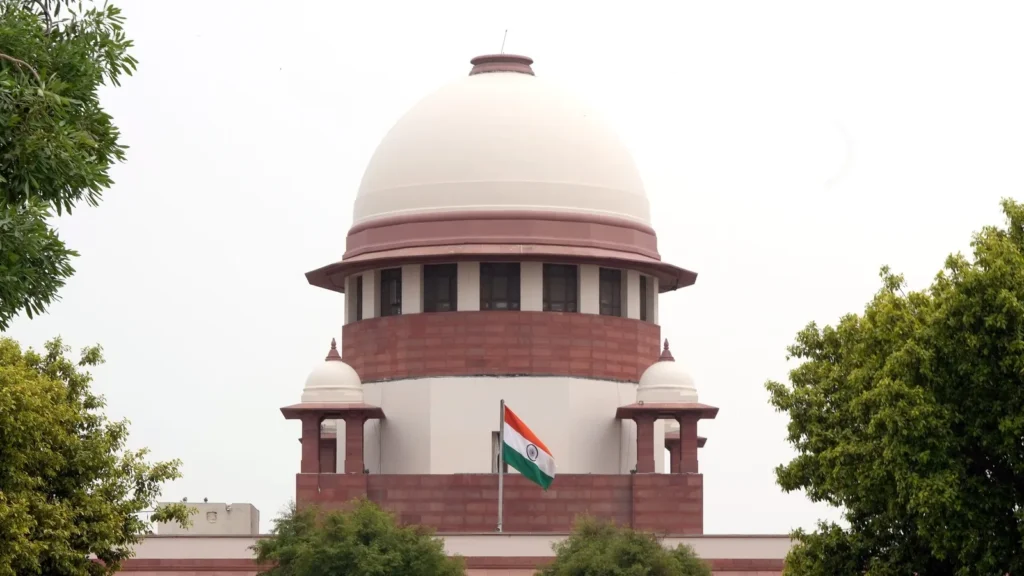The Central Government submitted a complete preliminary affidavit to the Supreme Court for dismissal of petitions against the Waqf (Amendment) Act, 2025. As presented in the 1,332-page document sent by Shersha C. Saidik Mohiddin, who works as Joint Secretary at the Ministry of Minority Affairs, the amendments receive strong legal support through comprehensive rebuttal of widely debated issues throughout the nation.
This case has emerged as an essential legal confrontation to determine the limits between religious independence and state control because its subsequent court session is scheduled for May 5, 2025. This text analyzes the main points the Centre presented together with their effects on Indian waqf administration.
The Constitutional Defense: Presumption of Validity
The Center bases its position on the established Court principle of “presumption of constitutionality.” Under this established principle, the Indian legal system validates all parliamentary laws until an opposing party proves their invalidity beyond a reasonable doubt.
The government implies in its affidavit that early suspension of an established legislative framework should
The imposition of an interim stay order disrupts the fine equilibrium maintained by legislative and judicial powers.
Also check:- “Dhami: ‘People Will Throw Away Mamata Banerjee’ Over Murshidabad Violence”
Undermine Parliament’s legislative authority
The decision would create unpredictable legal barriers for future legal battles.
The laws that come from Parliament operate under an automatic constitutional validity status until proven otherwise to a decisive standard. According to the affidavit, the principle of separation between judicial and executive powers would face violation through an interim suspension of legislation made by Parliament.
Secular Administration vs. Religious Interference: Drawing Clear Lines
The central government emphasizes that the Waqf Amendment Act solely concerns non-religious matters involving waqf property management while avoiding religious practices.
According to the government’s submission:
The Act stays away from managing prayer rituals because it only applies to secular waqf property management. The document states that the bill concentrates exclusively on the secular administration of waqf property management practices.
The Center denies all accusations of religious violation by asserting that the modifications only target :
- Record management and documentation
- Administrative reforms and governance
- Procedural improvements for transparency
- Protection of legitimate property rights
The government bases its constitutional defense on the distinction that exists between secular administrative management and religious devotional practice.
Also check:- Double-Engine or Double Trouble? Atishi Says BJP Failed as Delhi Faces Power Cuts
The Alarming Growth of Waqf Properties: Over 20 Lakh Hectares Added Since 2013
The center’s affidavit reveals a substantial expansion of waqf properties across 2,092,072.536 hectares that happened over the previous decade. Throughout 2013, the government reported that waqf properties expanded to include over 20 lakh hectares, exceeding 2,092,072.536 hectares of land.
The significant growth as reported by the Center has elevated multiple valid concerns.
- Inadequate documentation and verification.
- Potential encroachment on government and public lands.
- Lack of proper regulatory oversight.
- The management of waqf properties needs more transparent processes to make it function efficiently.
The government uses the massive land increase since 2013 to support the new amendments that will establish strict documentation and verification requirements.
Debunking the ‘Waqf-by-User’ Controversy
The ‘waqf-by-user’ doctrine remains a hot debate because opponents believe the amendments will create negative consequences for undocumented historic waqf assets.
Directive authorities specifically stated the following statements to address this matter:
Section 3(1)(r) of the Act explicitly protects registered waqf properties from any negative legal impacts because it specifies that already registered waqf lands will remain unaffected.
Since 1923, waqf properties have needed to register according to the Mussalman Wakf Act, followed by subsequent laws until the present day. The authorities claim various rumors spread through different channels are responsible for increased worry and resistance. The affidavit says removing ‘waqf-by-user’ will not affect properties that are already registered.
The Inclusion of Non-Muslims: Promoting Diverse Representation
Allowing non-Muslims in the Central Waqf Council and State Waqf Boards has triggered debate, with some fearing it could weaken Muslim representation in bodies that manage Muslim religious matters.
This new provision has received multiple defenses from the center, including :
1. Limited Representation with Clear Caps
- The government made clear that non-Muslim members constitute narrow and specific quotas within these boards.
- Four non-Muslim positions have been allocated from a total of 22 member roles in the Central Waqf Council.
- The number of non-Muslim members is limited to three members out of a total body of 11 members present in state Waqf boards.
- Such provisions guarantee that Muslims form the majority in these two Muslim religious bodies.
2. Secular Regulatory Bodies, Not Religious Institutions
- The center clarified that the Waqf Boards and the Central Waqf Council primarily serve administrative functions.
- Adding their membership does not diminish the representation of Muslims within these organizations.
3. Public Interest Considerations
Since Waqf Boards often handle properties that impact broader communities and public interests, the government argues that diverse representation promotes :
- Balanced decision-making
- Greater transparency
- Protection of multiple stakeholders’ interests
- Constitutional principles of equity
This defense frames the inclusion of non-Muslims as a measure to strengthen governance rather than weaken religious autonomy.
Protecting Government Land from Questionable Claims
One of the most practical justifications offered by the center relates to the protection of public land from potentially illegitimate waqf claims. The amendments empower government officers to determine whether properties claimed as waqf encroach upon government land.
The affidavit cites concrete examples where waqf claims have been made on:
- Collector’s offices and government buildings
- Public schools and educational institutions
- Archaeological Survey of India (ASI) protected heritage sites
- Municipal properties and public utility spaces
“These claims were often made without valid deeds or surveys—just unilateral records,” the government noted, highlighting the need for stronger verification mechanisms.
By establishing clearer processes for adjudicating such claims, the amendments aim to safeguard public assets while ensuring that legitimate waqf properties remain protected.
Judicial Oversight and Due Process
Throughout its affidavit, the Centre repeatedly highlighted that the amendments strengthen judicial oversight and due process in waqf property matters:
- All decisions regarding waqf property can be subjected to legal scrutiny
- No person is denied access to justice
- Transparency mechanisms have been enhanced
- Multiple levels of appeal remain available
These safeguards, according to the government, ensure that the amendments promote fair administration rather than arbitrary power.
Stay tuned for updates as the Supreme Court hearing approaches on May 5, 2025 !


